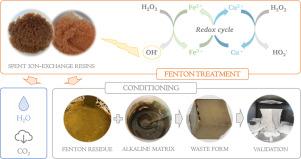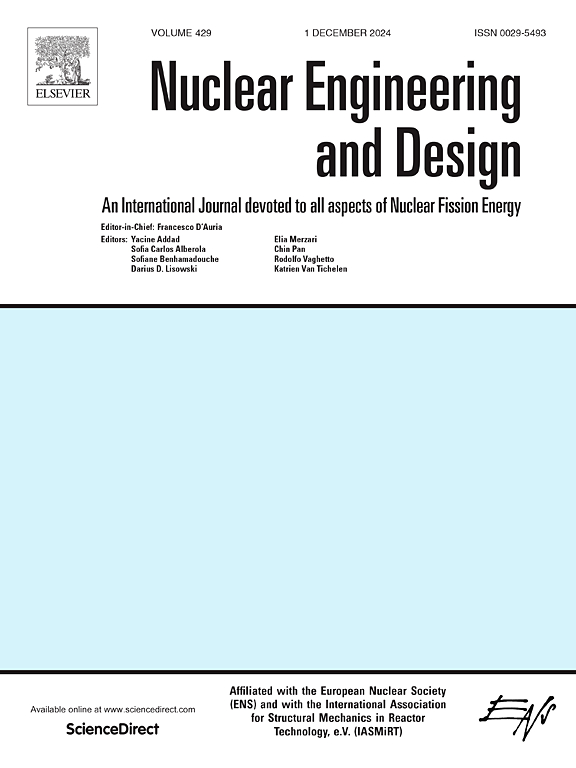Pre-disposal management of spent ion-exchange resins by Fenton oxidation treatment and conditioning in an alkali-activated matrix
IF 1.9
3区 工程技术
Q1 NUCLEAR SCIENCE & TECHNOLOGY
引用次数: 0
Abstract
The routine use of ion-exchange resins throughout the lifecycle of a nuclear facility poses significant issues regarding their safe and sustainable disposal at the end of their useful life. Effective strategies are thus required to overcome the challenging nature of this organic waste, aimed at minimizing volumes of the final waste forms, processing costs, and environmental impact. This work focuses on the pre-disposal management of spent mixed bed resins through the integration of a Fenton oxidative treatment process, an attractive environmentally friendly approach, and the successive encapsulation of the residues in an alkali-activated matrix. The successful treatment of a 20 g mix of cationic and anionic resins has led to a preliminary upscale of the process by using a surrogate waste (up to 200 g) loaded with representative activation and fission products contaminants. Some important process parameters were monitored, and the resulting residues were characterized. Finally, the obtained residues were encapsulated in an alkali-activated matrix with a loading factor up to 40 wt.%. Waste forms with residue loading factors up to 10 wt.% (corresponding to the conditioning of 0.6 kg of spent resin per kg of matrix) achieved preliminary compliance with waste acceptance criteria.

通过在碱激活基质中进行芬顿氧化处理和调节,对废离子交换树脂进行预处置管理
在核设施的整个生命周期中,离子交换树脂的常规使用对其使用寿命结束后的安全和可持续处置带来了重大问题。因此,需要采取有效的策略来克服这种有机废物的挑战性,以最大限度地减少最终废物形式的体积、处理成本和对环境的影响。这项工作的重点是通过整合芬顿氧化处理工艺(一种极具吸引力的环境友好型方法)和将残留物连续封装在碱激活基质中,对废混床树脂进行预处置管理。由于成功处理了 20 克阳离子和阴离子树脂的混合物,因此初步扩大了该工艺的规模,使用了含有代表性活化和裂变产物污染物的替代废物(最多 200 克)。对一些重要的工艺参数进行了监测,并对所产生的残留物进行了表征。最后,将获得的残余物封装在碱激活基质中,负载系数最高可达 40 wt.%。残留物装载系数高达 10 wt.%(相当于每公斤基质调节 0.6 公斤废树脂)的废物形式初步达到了废物接收标准。
本文章由计算机程序翻译,如有差异,请以英文原文为准。
求助全文
约1分钟内获得全文
求助全文
来源期刊

Nuclear Engineering and Design
工程技术-核科学技术
CiteScore
3.40
自引率
11.80%
发文量
377
审稿时长
5 months
期刊介绍:
Nuclear Engineering and Design covers the wide range of disciplines involved in the engineering, design, safety and construction of nuclear fission reactors. The Editors welcome papers both on applied and innovative aspects and developments in nuclear science and technology.
Fundamentals of Reactor Design include:
• Thermal-Hydraulics and Core Physics
• Safety Analysis, Risk Assessment (PSA)
• Structural and Mechanical Engineering
• Materials Science
• Fuel Behavior and Design
• Structural Plant Design
• Engineering of Reactor Components
• Experiments
Aspects beyond fundamentals of Reactor Design covered:
• Accident Mitigation Measures
• Reactor Control Systems
• Licensing Issues
• Safeguard Engineering
• Economy of Plants
• Reprocessing / Waste Disposal
• Applications of Nuclear Energy
• Maintenance
• Decommissioning
Papers on new reactor ideas and developments (Generation IV reactors) such as inherently safe modular HTRs, High Performance LWRs/HWRs and LMFBs/GFR will be considered; Actinide Burners, Accelerator Driven Systems, Energy Amplifiers and other special designs of power and research reactors and their applications are also encouraged.
 求助内容:
求助内容: 应助结果提醒方式:
应助结果提醒方式:


